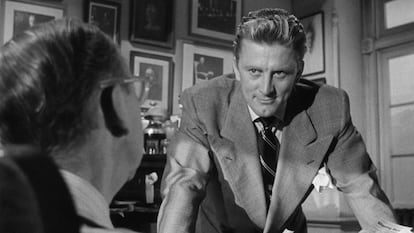Ten great scripts that didn’t win the Oscar
Billy Wilder’s ‘Ace in the Hole,’ Robert Zemeckis’ ‘Back to the Future’ and Charlie Chaplin’s ‘The Great Dictator’ are just a few of the films that were nominated but didn’t take home the statuettes

A careful review of Oscar nominees throughout history offers a clear conclusion: the Best Picture candidates, and even winners, have included many a forgettable and mediocre film. But it is harder to find such lapses in the Best Original Screenplay category. Over time, its nominees have included some of the most unique, exciting and unforgettable works in the history of the screen.
We’ve selected a series of films that were nominated for the latter category but did not win the title. They are all available to stream on digital platforms in the week leading up to this year’s ceremony.
The Great Carnival (1951), by Billy Wilder
“I don’t go to church. Kneeling bags my nylons,” says the wife in the film, about the possibility of seeking divine help to save her husband from a mine collapse. For this film, Wilder, who William Holden said had a “mind full of razor blades,” didn’t work with Charles Brackett, his co-writer for a period before I.A.L. Diamond, but with Lesser Samuels and Water Newman. The film explores the lack of scruples of yellow journalism, mass hysteria and the public spectacle of a man’s agony and death. The film was a box-office disaster, but it has since inspired a handful of other movies. The Oscar that year went to An American in Paris, a fantastic musical whose script is incomparable with Wilder’s.
Available on Filmin.
General de la Rovere (1959), by Roberto Rossellini
The wartime film’s main character is a professional con man, a man accustomed to taking on disguises, whether of solidarity, dignity or courage. “When you don’t know what the path of duty is, always choose the most difficult one,” says one of the emblematic lines of the script written by Sergio Amidei, Diego Fabbri and Indro Montanelli, who lost the Oscar to Elia Kazan’s Splendor in the Grass. The protagonist takes advantage of the Italian families of those detained by the Gestapo, extorting money in exchange for their hope. He is played by Vittorio de Sica, another film legend. His complexity lies in a disturbing nuance: he is never aware that he is cheating the families, only that he’s selling them comfort. You can’t live without Rossellini.
Available on Flixolé.
Back to the Future (1985), by Robert Zemeckis
The initial idea for the film came from Bob Gale. With its combination of effervescent science fiction and youthful comedy, it posed a question with a dangerous response: if you had met your father in high school, would you have been his friend? Gale and Zemeckis developed the premise with grace, seduction, hilarious dialogue and situations that mirror life in the present and the fifties, which allow for plenty of double readings. “The appropriate question is, when the hell are they?” Compared to the excessive seriousness (and even difficulty) of contemporary science fiction, the movie is light, and the narrative simplicity of the flux capacitor is wonderful. Five films competed for the best original screenplay of that year: Back to the Future, The Purple Rose of Cairo, The Official Story, Brazil and the winner, Witness.
Available on Netflix, Filmin, Movistar Plus+ and Amazon Prime Video.
The Purple Rose of Cairo (1985), by Woody Allen
That same year, when the script of Witness won, Allen had composed a story about the indelible dream of any movie fan: the protagonist stepping out of the screen to start a conversation and a relationship. In the fantastic The Modern Sherlock Holmes (1924), Buster Keaton had already told a story about a character, a projectionist, entering the film he was showing. Allen has always said that he needs to know where he is going before discovering how to achieve his goal in the stories, since he is afraid that even a great idea will end up fading after a dozen pages. Allen returns to Keaton’s concept and develops a masterful story in which the role of Mia Farrow must finally choose between reality and fantasy.
Available on Filmin.
Hell or High Water (2016), by David Mackenzie
A western with cowboys and bank robberies, with a fight to the death between the outlaw and the established power, is set in the contemporary America that gave Donald Trump his victory in the 2016 elections. The banks aren’t the same ones as those in classic Western movies, but they could well be, according to the mind behind this masterpiece of American social and genre cinema. For screenwriter Taylor Sheridan, the secret of writing is breaking the rules that he learned working for television. He says he writes very fast after building the script slowly in his head. Mackenzie put into images a story about the violent rebellion of a couple of guys in a time not suitable for antiheroes: “Even a blind pig sometimes finds a truffle.” The winner of the award was Kenneth Lonergan, for the sorrowful Manchester by the Sea.
Available on Amazon Prime Video.
My Night at Maud’s (1969), by Éric Rohmer
The film features a cast of just four characters. It is set almost entirely in a strange living room-bedroom, and the characters talk incessantly, reflecting on Pascal, Jansenism and Catholicism. It was an Oscar candidate along with works such as Love Story and Patton, which won the statuette. The film was made during the extraordinary and daring years of New Hollywood. An artless Don Juan, who is also a devout Christian, finds himself confronted on a snowy night with an emotionally intelligent divorceé, in the third of Rohmer’s Moral Tales. Four actors and actresses interpret the text as if they were improvising it in the moment.
Available on Filmin.
The Great Dictator (1940), by Charles Chaplin
The main objective of the script was to “laugh at Hitler.” It was written before the start of World War II. Chaplin confessed in his autobiography that he would not have made the film if he had known what would later occur in the death camps: “I could not have made fun of the homicidal insanity of the Nazis.” The contrast between a Jewish barber and the crazy and bloodthirsty Nazi Adenoid Hynkel, dictator of Tomainia, both played by Chaplin, finds its last reflection in the famous final speech: “The hate of men will pass, and dictators die, and the power they took from the people will return to the people. And so long as men die, liberty will never perish.” Nominated for five Oscars, it left empty-handed. The award went to the also exceptional Preston Sturges of The Great McGinty.
Available on Movistar Plus+, Filmin and Acontra+.
Magnolia (1999), by Paul Thomas Anderson
With his usual compassionate gaze and the songs of Aimee Mann, including a beautiful, uplifting musical sequence with his characters crying out for a cure for their sorrows, Anderson crafted a script driven by a strategy that few other directors have mastered: visual writing. His writing includes not just words, but also successive images and concepts, text and figuration, sound and music, all in perfect harmony. The rain of frogs in chapter eight, verse two, of the book of Exodus acts as a climax. The lives of twenty main characters are intertwined with prodigious lucidity in this contemporary epic. Alan Ball won the award for American Beauty, in a year in which the other nominees were Charlie Kaufman, M. Night Shyamalan and Mike Leigh.
Available on HBO and Movistar Plus+.
Three Billboards Outside Ebbing, Missouri (2017), by Martin McDonagh
A mother’s rage at her daughter’s rape and murder gone impune meets the dark humor of British playwright Martin McDonagh. Are they reconcilable? The film proves they are: dark and light, deep and funny, delicate and violent, socially revealing and inventive. Three Billboards is many things at once. For McDonagh, an admirer of Nicolas Roeg, Michael Powell and Emeric Pressburger, the dramatic formulas and structures of scriptwriting manuals are “fucking boring.” The creative challenge was to make that character not sentimental, motherly and pleasant, but someone truly three-dimensional. Jordan Peele’s Get Out scooped the screenplay award.
Available on Disney+.
The Discreet Charm of the Bourgeoisie (1972), by Luis Buñuel
A gang of friends goes out to dinner. Despite going through houses to which they had been invited, restaurants and various venues, they don’t make it through the film. It is a kind of lewd, culinary version of The Exterminating Angel, and just as absurd. Buñuel and Jean-Claude Carrière, his co-writer, wrote five versions of the script, searching for a balance between the logic of the situation and the accumulation of unexpected obstacles for the long-awaited dinner. Motifs from Buñuel’s filmography come together in this anarchic and lustful, perfidious and comical work: coffins and wakes; the diners holding an unconventional conversation at a table; the habits of priests, priests and bishops; crosses, shoes, pianos, eroticism, bare legs. The Candidate, a notable political satire with Robert Redford, stole the screenplay award; instead, Buñuel and Carrière won the Oscar for Best Foreign Film.
Available on Filmin.
Sign up for our weekly newsletter to get more English-language news coverage from EL PAÍS USA Edition
Tu suscripción se está usando en otro dispositivo
¿Quieres añadir otro usuario a tu suscripción?
Si continúas leyendo en este dispositivo, no se podrá leer en el otro.
FlechaTu suscripción se está usando en otro dispositivo y solo puedes acceder a EL PAÍS desde un dispositivo a la vez.
Si quieres compartir tu cuenta, cambia tu suscripción a la modalidad Premium, así podrás añadir otro usuario. Cada uno accederá con su propia cuenta de email, lo que os permitirá personalizar vuestra experiencia en EL PAÍS.
¿Tienes una suscripción de empresa? Accede aquí para contratar más cuentas.
En el caso de no saber quién está usando tu cuenta, te recomendamos cambiar tu contraseña aquí.
Si decides continuar compartiendo tu cuenta, este mensaje se mostrará en tu dispositivo y en el de la otra persona que está usando tu cuenta de forma indefinida, afectando a tu experiencia de lectura. Puedes consultar aquí los términos y condiciones de la suscripción digital.









































